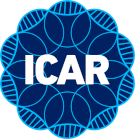Feed and Gas Working Group
Objectives of the Feed and Gas Working Group
The objectives of the Feed and Gas Working Groups are to:
- Provide a forum for members of ICAR and associated researchers to collaborate, exchange information and learn from each other on all aspects of: recording and using dry matter intake data, and recording and using methane outputs data.
- Maintain, update, promote and extend universal guidelines for recording dry matter intake and methane output in cattle, sheep and goats world-wide
- Conduct and report the results of periodic international surveys on recording dry matter intake and methane output in cattle, sheep and goats worldwide.
- Develop, provide and promote a system and standards for data storage and genetic evaluation services which will form the basis of services that ICAR will provide to members of ICAR and their research associates on a user pays basis.
- Facilitate and coordinate international collaboration in research and development on recording and using dry matter intake data, and recording and using methane outputs data.
Find link to guidelines of recording Feed Intake for Genetic Evaluation here:
Recording Feed Intake for Genetic Evaluation
Find link to guidelines of recording Methane for Genetic Evaluation here:
Recording Dairy Cattle Methane Emission for Genetic Evaluation Guideline
Members of ICAR Feed and Gas Working Group
Below are the members of the Feed and Gas Working Group listen in alphabetic order, including a short description.
| Researcher | Picture |
|---|---|
| Name: Rasmus Bak Stephansen
Affiliation: Aarhus University, Center for Quantitative Genetics and Genomics E-mail: rasmus.stephansen@qgg.au.dk Homepage: https://pure.au.dk/portal/da/persons/rasmus.stephansen%40qgg.au.dk Research topic: My research is focusing on enhancing phenotyping and modeling of feed efficiency in livestock, with a specific emphasis on lactating animals. The challenges posed by the early lactation dilemma are a central focus, driving efforts to develop new modeling approaches. Furthermore, my research extends to exploring the genetic architecture linking feed efficiency to methane emissions, as well as its impact on animal functionality and welfare. |
 |
- Christine Baes
- Karoline Bakke
- Lorenzo Benzoni
- Raffaella Finocchiaro
- Maria Frizzarin
- Nina Krattenmacher
- Jan Lassen
- Jennie Pryce
- Caeli Richardson (2023 Brian Wickham Young Persons Exchange Program Bursary)
- Rasmus Bak Stephansen
